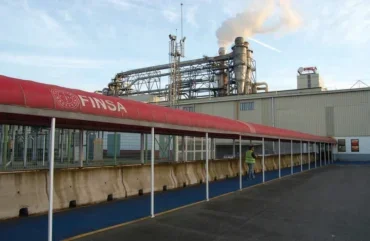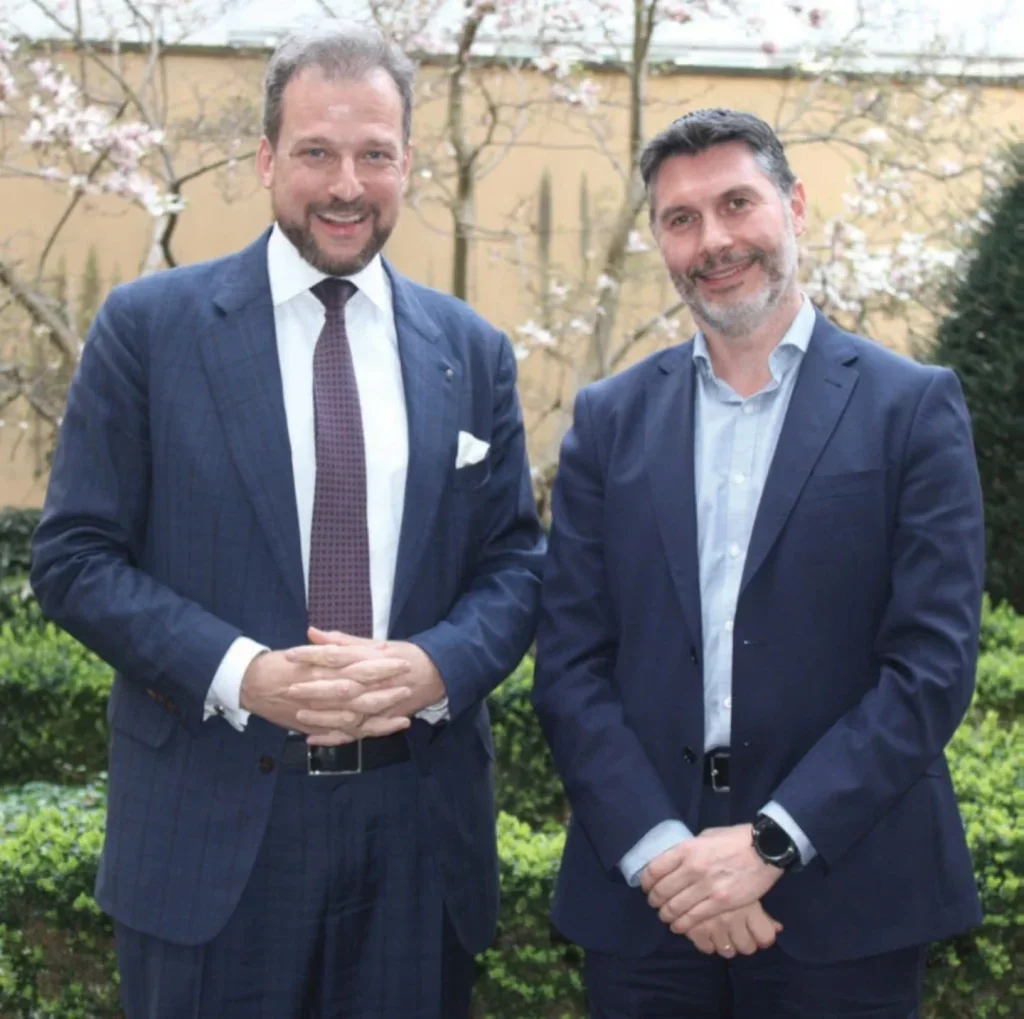
Pablo Figueroa Lopez, executive committee member and Head of Sales & Finance at wood-based panels producer Finsa, has become the first Spaniard to become chairman of the European Panel Federation (EPF).
His elevation from EPF vice-chairman followed an announcement from EPF chairman Martin Brettenthaler earlier this year that he was stepping away from his role leading Swiss Krono and would also exit EPF leadership.
The EPF is, of course, the leading woodbased panels representation group in Europe and conducts a huge range of technical, advocacy and lobbying work on behalf of panel producers across the region.
After Mr Figueroa Lopez took up his new two-year position, he told WBPI that to become EPF chairman was both a “pleasure” for him and Finsa, as well as a “great responsibility”.
He has hit the ground running but was quick to pay tribute to both Mr Brettenthaler and also fellow former EPF chairman Paolo Fantoni for their hard work at the EPF in recent years, as he seeks to build on the leadership that they and others have created.

Mr Figueroa Lopez’s rise to EPF chairman follows some 25 years working with Iberian panel producer Finsa.
“I studied economics at Santiago de Compostela University, then completed a master’s degree,” he explained.
“I joined Finsa and it is the only company and industry that I have known.”
His company roles have included different roles in various countries, including sales and marketing positions. He was managing director of Finsa’s UK business at Birkenhead from 2002-2008 and MD at decorative printing business Decotec for six years while it was owned by Finsa (Decotec is now part of Interprint under the name Interprint Spain).
“If I have to say where and when I learned the most in the industry, I would say it was that period in Decotec. It was kind of an umbrella to understand the whole industry, dealing with many companies across the world – panel makers, impregnators, worktop manufacturers and furniture makers.
“I enjoy working with the people in this industry and with wood as a natural material.
“The majority of companies in our field are family-owned businesses, which I believe gives something extra in the way we treat each other.
“It’s about the forest right up to final end user and we need to look after each stage well if we want to really consolidate an industry like ours in a good way.”
WOOD-BASED PANELS MARKETS
Mr Figueroa Lopez takes the EPF helm at a time of market difficulties for the European wood-based panels sector.
“Our industry is in great shape, with probably stronger than ever well-structured companies, and with great people who are very well skilled, but the economy is probably reaching the end of a very long and great cycle that has lasted since the end of the big crisis 2008-2013,” he said.
“This is now showing the first downside signals which are affecting our sector.”
Production of all category panels combined within EPF show a decline year-onyear in 2023 of slightly over 6%, with some categories in double digit declines.
“Geographically, the strongest hit [on consumption] up to now in Europe is being seen in western Europe and eastern Europe, with a softer impact on the European Atlantic coast and also southern Europe.
“By sectors, the furniture Industry is perhaps the one that is noticing more these grey clouds ahead. Having said that, the outcome from the Covid [economic bounce] for our industry field was very positive, but this wave is starting to slow down.”
Mr Figueroa Lopez said household consumption levels had fallen and so had family priorities – with travel and eating out seemingly more a focus now than renovating the house.
The last six months has been particularly difficult in Europe, though the impact is felt in varying degrees in different countries.
“We have noticed countries like Germany and the kitchen industry softening a lot. The capacity to compete with competitors outside the EU is not so good, but there is also a decline in internal consumption in the likes of Germany, Austria, the Czech Republic and Poland.”
Laminate flooring, Mr Figueroa Lopez added, had experienced harsh market conditions, with countries seeing anywhere between 10-25% reverses in product sales.
“The level of refurbishments has declined a lot, especially compared to 2021 and 2022. We also face more and more competition from other kinds of products like vinyl flooring.”
So how does he see markets developing into 2025?
“It’s very difficult to have a crystal ball. We [Finsa], like all companies in the industry, did the 2024 budget last year in October and November. Then we were expecting a very tough 2024 from the beginning.
“Nevertheless, there has been variation in each country. For some countries we are pretty much the same as we were in the first half of 2023. Some others have been quite a lot worse though. But what is clear is that the second half of the year is going to be quite challenging.
“We’ve had 10 years of prosperity and incredible figures for the industry. This is probably reaching an end. But it’s also true that the economic cycles are not so hard as they used to be. So, we wouldn’t be forecasting a tough fall, but something much milder.”
Nevertheless, Mr Figueroa Lopez expects a recovery in 2025 and would like to see some further cuts in bank interest rates around the world to stimulate economic activity.
While he could foresee one or two rate cuts before the end of 2024, any positive impact would be delayed to the first half of 2025.
“The EPF has no firm predictions for 2024, but we reckon it shouldn’t be far away from 2023, so still on the decline side, whether it will be 3%, 4% or 5% down we don’t know.”
The fact that costs of energy and resin have moderated compared to two years ago is a help in terms of stability.
EPF FIVE PILLARS
The EPF unveiled its strategic five pillar action plan for the wood-based panels sector three years ago. The five main focus points are:
- being a role model industry;
- wood availability;
- regulation;
- harmonisation;
- climate.
These areas, said Mr Figueroa Lopez, would continue to be strategic focus points for EPF going forward.
More information was needed on wood raw material availability across Europe, including an accurate breakdown of material that is used by the various forest product sectors, such as cellulose and pulp, engineered wood such as CLT and LVL, the veneer sector and wood-based panels.
EPF is working on mapping to help, but it acknowledges there is a shortage of raw material.
“Biomass is growing all across Europe. If in the end biomass is not performing within the cascading use of wood principle, then we are putting our industry at risk. We have no problem with biomass, as long as we use the cascading use of wood in the right way by using wood waste from previous applications, not burning virgin fibre.”
Mr Figueroa Lopez said finalisation of a new ½ E1 formaldehyde standard and the inclusion of cascade use of wood in legislation for the first time were big achievements.
“We need to emphasise that we are one Europe, from east to west, from particleboard to plywood, including everything in between and that our industry is still far off being well recognised and appreciated at all levels by the European Institutions.
“We are part of a big solution, but to show it we need to be heard at all levels in Brussels, something that we will be pursuing more and more. Over-regulation, lack of harmonisation and the risk of [low] wood availability are in our heads everyday.
“Over the last few years the EPF has been very focused on risks – formaldehyde, melamine, so many issues. Bringing more awareness of our contribution to society and growing our market share will be priorities in the coming years.”
EPF ORGANISATION
Mr Figueroa Lopez highlights collaboration and teamwork as strengths of the EPF and says this approach will continue and characterise his period in office.
“EPF is not a top-down organisation, it is an organisation built by a strong managing board, many great companies, national associations, working groups, task forces and a passionate, capable and well-led team in Brussels.
“Therefore, we have no intentions of making any revolution, but an evolution of our well-based five strategic pillars and the milestones on which each one is deployed.
“The chairman of the EPF is just a way of showing we are one managing board. We want to be a collaborative organisation. That means several things, that the managing board performs as one, approving proposals that will arrive from national organisations, working groups and task forces. Our idea is to reinforce the role of national associations and working groups, under the umbrella of the EPF staff in Brussels.”
Giving the national associations a bigger role will be a target.
Mr Figueroa Lopez said it was important to him that every managing board member had asked him to take on the EPF chairman role, giving a unanimous mandate for his two-year term of office.
His first action was to ask the managing board and each national association for feedback about what was working well in the EPF and what can be reinforced or improved. Together with EPF managing director, Clive Pinnington, the feedback was reviewed and summarised in 11 points and the EPF is working on each of them.
“This shows how this is a collaborative way of working,” said Mr Figueroa Lopez.
As for the future, he believes it is bright and that the industry will carry on developing state of the art technologies, improving efficiency, being an example of good practices, bringing the latest decorative trends and innovative construction solutions.
Wood-based materials need to work alongside other construction and decoration materials such as steel and concrete, he added. Hybrid construction formats were showing this can be successful.
“Probably the most important thing is to communicate with policy makers in Europe. It’s very difficult sometimes to be heard in the right way. Our industry is part of the solution in the decarbonisation of the European economy, and we need time to explain things and to be heard with understanding.”
Overall, Mr Figueroa Lopez said the industry will need to be focused and agile as it confronts both the risks and opportunities in the coming years, as it seeks to increase market share.
His great passion for the product and people in the industry keeps him energised.
“In 25 years in the industry I have so far never had one day when I returned home and said I can’t continue working here. I have never ever regretted working in this industry – the opposite in fact! And the EPF is a great organisation representing its interests.”






